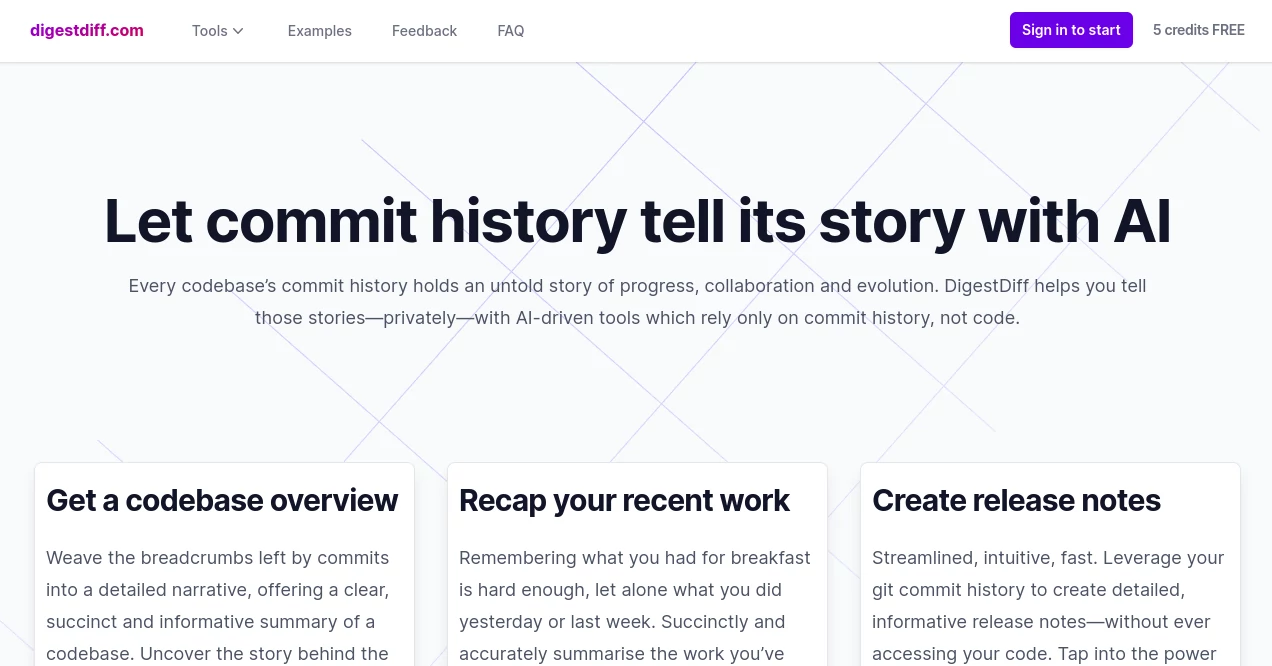🧠 AI Quiz
Think you really understand Artificial Intelligence?
Test yourself and see how well you know the world of AI.
Answer AI-related questions, compete with other users, and prove that
you’re among the best when it comes to AI knowledge.
Reach the top of our leaderboard.
DigestDiff
Unlock Insights from Your Code's Story

What is DigestDiff?
DigestDiff slips into the rhythm of development teams, pulling tales from the quiet lines of commit logs to spotlight what really moved the needle. It's that sharp glance over a project's shoulder, turning raw timestamps and messages into snapshots that make sense of the grind. Coders and leads alike turn to it when they need a quick pulse check on progress, without digging through endless diffs or forgotten branches.
Introduction
DigestDiff sprang from the all-too-familiar chaos of codebases where history gets buried under layers of updates. A handful of devs, weary of piecing together narratives for meetings or releases, built it to do the heavy lifting—scanning logs to weave coherent stories. It hit the scene quietly but caught fire among remote squads who craved ways to sync without endless scrolls. Now, it's a quiet staple for outfits juggling sprints, where a five-minute recap can replace an hour of chit-chat, and users swap tales of how it surfaced overlooked gems that sparked better calls all around.
Key Features
User Interface
You step in through a straightforward dashboard that lays out your options like a well-thumbed notebook—tabs for overviews, recaps, or notes that flip without a fuss. Paste in a log or link a repo, and the screen shifts to a live preview pane, where drafts build in real time. It's all clean edges and subtle cues, like a tooltip here for tone tweaks, keeping things light so you focus on the story, not the setup.
Accuracy & Performance
It sifts through logs with a keen eye, linking messages to milestones in ways that ring true to the project's beat—rarely missing a beat or bloating with fluff. Even chunky histories process in a flash, spitting out polished takes that hold up under team scrutiny. Folks note how it nails the nuances, like crediting the right hands on a fix, turning what could be a dry list into something that actually informs.
Capabilities
From crafting a full arc of a repo's life to boiling down last week's tweaks for a huddle, it flexes across the dev cycle. Dial in the vibe for notes—crisp for pros or chatty for crews—and export straight to markdown for easy shares. It hooks into repos seamlessly or takes manual drops, bridging solo tinkers to full squads without skipping a step.
Security & Privacy
Logs stay surface-level, never dipping into the code itself, with read-only peeks that vanish once the job's done. Nothing gets stashed on their end, and you hold the reins on what flows in or out, making it a safe bet for guarded projects. It's the kind of setup that lets you breathe easy, knowing your commits tell the tale without spilling secrets.
Use Cases
A new hire skims a repo's rundown to catch the flow before their first push, dodging the usual week-long haze. Sprint wrap-ups get a lift from auto-recaps that highlight wins and snags, fueling sharper retros. Release wranglers lean on it to draft changelogs that actually excite users, blending tech talk with plain wins. Even scattered freelancers use it to log personal streaks, turning solo grinds into shareable highlights for gigs.
Pros and Cons
Pros:
- Turns messy logs into crisp narratives that save meeting marathons.
- Sticks to commits only, keeping code vaults untouched and private.
- Custom tweaks for tone and length fit any crowd or quick hit.
- Markdown outs make it a snap to slot into docs or chats.
Cons:
- Free spins cap at five, nudging regulars toward more credits.
- Manual pastes add a step for non-repo workflows.
- Best with detailed logs—sparse ones might skim the surface.
Pricing Plans
Jump in with five free credits on signup, good for testing any tool on public or private spots. Beyond that, it's a credit-per-use model, with bundles starting low to keep things rolling for light teams—think a few bucks for a month's worth of recaps. No hard locks, so you scale as sprints heat up, and they toss in extras for steady users without the usual upcharge grind.
How to Use DigestDiff
Sign in quick to snag your starter credits, then pick a tool and feed it a log—link your repo or paste the output straight. Tweak the focus if you like, hit go, and watch the summary shape up. Scan for tweaks, export to markdown for your notes app or Slack, and loop back for the next round. It's that simple loop that keeps the momentum without the drag.
Comparison with Similar Tools
Where full code scanners dig wide but deep into lines, DigestDiff hones in on the log layer for quicker, lighter lifts—ideal if privacy's your north star. Against changelog generators, it adds that narrative flair without forcing templates, though those might edge out for rigid formats. It carves a niche for teams wanting insights minus the invasiveness, blending speed with smarts where others overreach.
Conclusion
DigestDiff quiets the noise of dev diaries, handing you stories that bridge gaps and spark nods around the table. It's the understated boost that turns history into hindsight gold, letting squads move faster with clearer eyes. In a world of code that never sleeps, this tool whispers just enough to keep the pulse strong and the path lit.
Frequently Asked Questions (FAQ)
Does it peek at my actual scripts?
Nope, sticks to the log surface—your code stays behind closed doors.
What if my repo's behind a wall?
It reads private ones fine, or just paste the log for full control.
Can I shape the output voice?
Pick your tone and trim the length to match the moment.
How do credits shake out?
Five free to start, then grab packs as your needs ramp up.
Works with other version spots?
Built for GitHub logs, but manual drops open doors to more.
AI Summarizer , AI Code Assistant , AI Knowledge Management , AI Productivity Tools .
These classifications represent its core capabilities and areas of application. For related tools, explore the linked categories above.
DigestDiff details
This tool is no longer available on submitaitools.org; find alternatives on Alternative to DigestDiff.
Pricing
- Free
Apps
- Web Tools
Categories
DigestDiff Alternatives Product


















